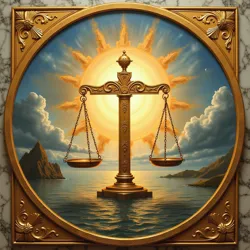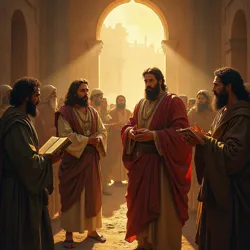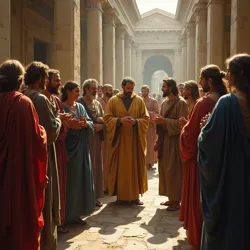Orthodox Prophetic Bearing and the Conscience of Justice

A figure standing firm, representing the intersection of Orthodox faith, personal conscience, and the pursuit of justice against systemic injustice.
Dimension of living the Gospel
Prosopon (unique personhood)
Kenosis (self-emptying love)
Synergy (cooperation with grace)
Obey God over human authorities
Martyrs, St. John Chrysostom, St. Maria of Paris
Resist laws violating conscience/dignity
Repentance, humility, communal discernment
Within the framework of Orthodox Christianity, the relationship between personal conscience, collective justice, and engagement with political or systemic structures is a complex and deeply rooted aspect of its spiritual and historical tradition. It is not approached as a purely political science but as a dimension of the broader call to live according to the truth of the Gospel, which inherently challenges falsehood, oppression, and the degradation of human dignity. This involves navigating the tension between the Gospel's call to humility, obedience, and prayer for authorities, and the equally strong imperative to stand for truth, protect the vulnerable, and bear witness against evil, even when it originates from those in power.
The Church's understanding of these matters draws heavily from the Holy Scriptures, the lives and teachings of the saints, the pronouncements of ecumenical and local councils, and the liturgical life which continually re-presents the Kingdom of God—a reality distinct from and often challenging to earthly kingdoms. The concept of Prosopon, the unique and sacred personhood of each individual created in the image of God (Imago Dei), forms a foundational theological basis for understanding inherent human dignity. This dignity is not conferred by state or society but is ontologically given by God, implying that any system or action that violates this dignity is fundamentally opposed to divine will. The pursuit of justice, therefore, is seen not merely as a social or political goal but as a spiritual struggle (agon) for the recognition and upholding of this God-given worth in every person.
Theological Foundations of Righteous Action
The theological underpinnings for an Orthodox approach to justice and conscience are manifold, woven into the very fabric of its doctrine concerning God, humanity, and the cosmos. At the heart of this lies the belief in God's absolute righteousness and love, which are inseparable. God is the source of all truth and goodness, and humanity is called to participate in these divine energies through the process of Theosis, or deification—a journey of becoming like God through grace. This journey necessitates living in accordance with God's will, which includes actively loving one's neighbor and striving for justice in the world.
 Symbols representing theological concepts like prosopon (personhood), kenosis (self-emptying), and synergy (cooperation), illustrating the divine basis for righteous action.
Symbols representing theological concepts like prosopon (personhood), kenosis (self-emptying), and synergy (cooperation), illustrating the divine basis for righteous action.Another crucial concept is Kenosis, the self-emptying love exemplified by Christ's incarnation, suffering, and death. This divine humility serves as the model for human action, suggesting that true power is found not in domination or coercion but in self-sacrificial service and vulnerability for the sake of truth and love. Applied to matters of justice, kenosis informs the disposition with which one engages with injustice – seeking not personal gain or worldly power, but serving the truth and the dignity of others, even at great personal cost. This perspective fundamentally distinguishes Orthodox engagement from purely ideological or power-driven activism.
Prosopon and the Dignity of the Person
The Orthodox understanding of personhood, articulated through the concept of prosopon (Greek: πρόσωπον), is central to its stance on justice. While often translated simply as "person," prosopon signifies a unique, relational, and irreducible reality that transcends mere individuality or function. Each prosopon is a specific instantiation of human nature (ousia), called into communion with God and others. This theological anthropology asserts that every human being, regardless of their social status, ethnicity, beliefs, or circumstances, possesses inherent and inviolable dignity because they are created in the image of the triune God, who exists as a communion of divine hypostases (persons).
This understanding directly challenges any system or ideology that reduces individuals to categories, objects, or means to an end. Totalitarianism, racism, extreme economic exploitation, and any form of dehumanization are theological affronts because they deny the reality of the prosopon. Therefore, standing for justice is, in essence, standing for the truth of who the human being is in God's eyes. It is a defense of the sacredness of each life and the call to communion and love that defines human existence according to Orthodox teaching.
Synergy and the Call to Action
The concept of Synergy (Greek: συνεργία), meaning cooperation or working together, describes the relationship between divine grace and human will in the process of salvation and spiritual growth. This principle extends beyond individual piety to encompass communal and social action. The ability to perceive injustice, to feel compassion for the suffering, and to act courageously for truth is understood not as solely a human capacity but as a result of the human will cooperating with the enabling grace of God.
This theological framework implies that authentic action for justice is not born merely from human effort or moral indignation, but from a synergy between the human desire for righteousness and the power of the Holy Spirit. Such action is therefore grounded in prayer, sacramental life, and the ascetic struggle against passions like anger, pride, and self-righteousness that can corrupt even well-intentioned efforts. The call to act is not a burden of individual heroism but an invitation to cooperate with God's ongoing work in the world, drawing strength and guidance from divine energy.
Scriptural Witness to Justice and Prophetic Confrontation
The Holy Scriptures provide the foundational narrative and moral imperatives that shape the Orthodox perspective on justice. Both the Old and New Testaments are replete with calls to righteousness, denunciations of oppression, and examples of individuals who confronted injustice at great personal risk.
 Images depicting Old Testament prophets speaking truth to power or New Testament scenes of Christ and the Apostles challenging religious or civil authority.
Images depicting Old Testament prophets speaking truth to power or New Testament scenes of Christ and the Apostles challenging religious or civil authority.The Old Testament prophets, such as Amos, Isaiah, and Jeremiah, serve as powerful exemplars of prophetic bearing. They spoke truth to power, condemning the social and religious elite for their corruption, exploitation of the poor, and failure to uphold God's covenant. Their message was often unpopular and led to persecution, yet they persisted, driven by a divine imperative to call the people back to covenant faithfulness, which included just relationships. The book of Amos is particularly stark in its condemnation of social injustice:
"Thus says the Lord: For three transgressions of Israel, and for four, I will not revoke the punishment; because they sell the righteous for silver, and the needy for a pair of sandals— those who trample the head of the poor into the dust of the earth, and push the humble out of the way; father and son go in to the same girl, so that my holy name is profaned; they lay themselves down beside every altar on garments taken in pledge; and in the house of their God they drink wine bought with the fines they imposed. ... I hate, I despise your festivals, and I take no delight in your solemn assemblies. Even though you offer me your burnt offerings and grain offerings, I will not accept them; and the offerings of well-being of your fatted animals I will not look upon. Take away from me the noise of your songs; I will not listen to the melody of your harps. But let justice roll down like waters, and righteousness like an ever-flowing stream." (Amos 2:6-8, 5:21-24, NRSV)
This prophetic tradition emphasizes that true worship and piety are inseparable from righteous living and the pursuit of justice in societal structures.
The Example of Christ and the Apostles
In the New Testament, Christ Himself embodies prophetic confrontation. While His primary mission was salvation through His passion and resurrection, His earthly ministry included challenging the religious authorities for their hypocrisy and legalism, driving money changers from the Temple, and consistently siding with the marginalized, the poor, and the outcast. His teachings on love, mercy, and the inherent worth of each individual (prosopon) provide the ethical framework for Christian engagement with the world. The Beatitudes (Matthew 5:1-12), for instance, bless those who hunger and thirst for righteousness, the merciful, and the peacemakers, suggesting a divine affirmation for active pursuit of these virtues.
The Apostles continued this pattern. Peter and John, when commanded by the Sanhedrin not to speak or teach in the name of Jesus, responded, "Whether it is right in God's sight to listen to you rather than to God, you must judge; for we cannot keep from speaking about what we have seen and heard" (Acts 4:19-20). Later, facing the same council, Peter declared, "We must obey God rather than human beings!" (Acts 5:29). This fundamental principle – that obedience to God takes precedence over obedience to human authority when the two conflict – is a cornerstone of the Orthodox understanding of the limits of state power and the basis for righteous disobedience.
Historical Praxis: Witnesses Against Unjust Power
Throughout its history, the Orthodox Church has encountered various forms of political authority and systemic injustice, leading to diverse responses ranging from quiet endurance and prayer to outspoken denunciation and active resistance. The lives of the saints offer concrete examples of how these principles have been lived out in different contexts.
 Scenes showing early Christian martyrs facing persecution or modern figures like St. Maria of Paris aiding those suffering under oppression, representing resistance to unjust power.
Scenes showing early Christian martyrs facing persecution or modern figures like St. Maria of Paris aiding those suffering under oppression, representing resistance to unjust power.The early Christian martyrs provide the initial and perhaps most foundational example of resistance rooted in conscience. Their refusal to participate in the imperial cult, which demanded worship of the Roman Emperor as divine, was not a political rebellion in the modern sense but a profound spiritual and theological act. It was a refusal to grant ultimate allegiance to any earthly power, asserting that "Jesus is Lord" (1 Corinthians 12:3) meant no other – including the Emperor – held that supreme title. This refusal, leading to torture and death, was a powerful witness (martyria) against the totalitarian claims of the Roman state and established a precedent for the limits of civic obedience.
Voices from the Empire
During the Byzantine Empire, where the Church and state were intricately linked, figures like St. John Chrysostom (c. 347–407 AD), Archbishop of Constantinople, exemplified prophetic courage within a Christianized political structure. Chrysostom was renowned for his eloquent preaching (Chrysostom means "golden-mouthed") and his fearless critiques of social injustice, economic inequality, and the moral failings of the imperial court, including Empress Eudoxia. He condemned the lavish lifestyles of the wealthy while many suffered poverty, and he spoke out against the abuse of power. His outspokenness eventually led to his exile and death, illustrating that even within a nominally Christian empire, upholding Gospel truth could bring one into conflict with powerful authorities. His life demonstrates that the prophetic role extends to challenging injustice within one's own society and even within the Church itself if necessary.
Another significant example, though debated historically, is the potential witness of figures who may have critiqued imperial policies from a monastic perspective, perhaps recorded in texts like the hypothetical Apophthegmata of the Desert Pillars, which might contain sayings of monastics who withdrew from society partly in protest against the perceived corruption of worldly power, including that of the state. While withdrawal was their primary mode, their very existence and pronouncements could serve as an implicit critique.
Witness in the Modern Age
In more recent history, numerous Orthodox figures have stood against systemic injustice. St. Maria of Paris (1891–1945), a nun and theologian, is a powerful example from the 20th century. Living in Paris during the Nazi occupation, she actively worked to shelter Jews, providing them with forged documents, housing, and a safe haven in her mission center. Her actions were a direct contravention of the occupying regime's laws and policies. Rooted in her deep theological understanding of Christ's identification with the suffering and her commitment to active love for neighbor, her resistance was a spiritual imperative. She was eventually arrested and died in the Ravensbrück concentration camp, becoming a modern martyr for justice and compassion. Her life demonstrates that Christian conscience compels active intervention against evil, even when it requires breaking unjust laws and risking one's life.
During the Soviet era, countless Orthodox clergy, monastics, and laity suffered and died for their faith, refusing to renounce Christ or cooperate with the atheist regime's attempts to suppress the Church and control consciences. These New Martyrs and Confessors, like St. Tikhon, Patriarch of Moscow, who anathematized the Bolsheviks' persecution of the Church, represent a collective witness against totalitarianism and state-imposed ideology, echoing the stance of the early martyrs against the Roman Empire. Their resistance was primarily a refusal to compromise their faith, but this refusal had profound political implications, challenging the regime's claim to absolute authority over all aspects of life, including the spiritual and moral conscience.
Navigating Authority and Righteous Disobedience
The relationship between Christians and governing authorities is famously addressed in Romans 13:1-7, which calls for submission to the powers that be, describing them as established by God to maintain order and punish evil. This passage has often been interpreted within Orthodox tradition as a general principle favoring obedience to legitimate state authority, recognizing its role in preventing chaos and upholding a basic level of societal order, which is conducive to the Church's mission.
However, the Orthodox interpretation of Romans 13 has historically been nuanced and balanced by other Scriptural teachings and the lived experience of the Church, particularly the witness of the martyrs. Submission is understood as being to authority as God's servant for the good, implying that the authority itself is accountable to God and derives its legitimacy from its function in upholding justice and order in accordance with a higher, divine law.
Interpreting Submission
The Patristic interpretation of Romans 13 generally holds that submission is due to the office or institution of governance, which is divinely permitted for the sake of order, rather than unconditional obedience to every command of every ruler. St. John Chrysostom, in his homilies on Romans, explains that the Apostle is not commanding blind obedience to wicked rulers in all things, but rather establishing the general principle that civil authority is not inherently evil but serves a necessary function. The key is that this authority is God's "servant" or "minister" (diakonos), implying a responsibility to act justly.
Therefore, when a ruler or a system of governance ceases to be a servant of God for good and becomes an instrument of evil, demanding actions that violate God's commandments or the dictates of a rightly-formed Christian conscience, the duty to obey shifts. The foundational principle reasserted by the Apostles ("We must obey God rather than human beings!") takes precedence.
The Limits of Obedience
The lives of the martyrs serve as the most compelling demonstration of the limits of obedience to earthly powers. They did not rebel against the state's authority in general, but they refused to obey specific commands that required them to deny Christ, participate in idolatry, or commit acts contrary to their faith and conscience. This is not rebellion for the sake of rebellion, or a desire for political power, but a principled stance rooted in ultimate allegiance to God.
In situations of systemic injustice or authoritarianism, this principle becomes crucial. It suggests that while Christians are called to be peaceful citizens, pay taxes, and respect the laws that uphold order, they are simultaneously obligated to resist, non-violently and prayerfully, laws or policies that are fundamentally unjust, that violate human dignity, or that demand complicity in evil. This resistance might take forms such as conscientious objection, civil disobedience (accepted if it is non-violent and undertaken with awareness of the consequences), public denunciation, or acts of mercy and protection for victims of injustice, as seen in the life of St. Maria of Paris. The distinction lies in discerning when the state oversteps its God-given mandate and encroaches upon the sphere of divine authority or demands actions contrary to God's law and the sanctity of the human person.
Contemporary Challenges and Orthodox Witness
The theological and historical framework of Orthodox Christianity provides resources for addressing contemporary issues of injustice. While the Church does not endorse specific political parties or ideologies, its core values and teachings speak directly to modern crises such as environmental degradation, war and conflict, political corruption, racial and ethnic injustice, and authoritarianism.
Addressing systemic issues requires applying the principles of human dignity (prosopon), the call to righteousness, and the imperative of love for neighbor. Environmental concerns, for example, can be framed within the Orthodox understanding of the cosmos as God's creation, a sacred reality entrusted to humanity's stewardship, not ruthless exploitation. Injustice against creation is ultimately an injustice against the Creator and affects human well-being.
Witness in Conflict
In times of war and conflict, the Orthodox Church has historically sought to be a voice for peace and reconciliation, while also recognizing the complex realities of defense and national sovereignty. The concept of peacemaking (eirenopoiesis) is a blessing (Matthew 5:9), implying active work to restore broken relationships and achieve just peace. However, the Church has also historically blessed soldiers defending their homeland against aggression, distinguishing this from wars of conquest or unjust violence. The challenge in contemporary conflicts is discerning the path of true peace, which must be rooted in justice and respect for human life, avoiding complicity in atrocities or the dehumanization of the 'enemy'. This often requires a prophetic voice calling for restraint, denouncing war crimes, and advocating for diplomatic solutions and humanitarian aid.
Political corruption and authoritarianism directly challenge the Orthodox vision of a just society ordered under God. Corruption is seen as a sin because it involves dishonesty, theft, and the perversion of power for personal gain, often at the expense of the vulnerable. Authoritarianism, particularly when it demands absolute loyalty or suppresses fundamental freedoms of conscience, speech, and assembly, echoes the challenges faced by the early martyrs and the New Martyrs of the 20th century. The Orthodox response, while typically avoiding violent revolution, involves upholding truth, refusing complicity in falsehoods, praying for those in power while also praying for deliverance from evil rulers, and supporting those who suffer under oppression through acts of mercy and solidarity. The hypothetical concept of the "Covenant of the Hearth and Crown," a historical arrangement in some Orthodox societies outlining mutual responsibilities and limitations between Church and state, could be seen as an attempt, however imperfect, to formalize a balance of power rooted in shared faith but respecting distinct spheres.
Addressing Systemic Wrongs
Racial and ethnic injustice are theological issues because they deny the fundamental truth of the prosopon – that all human beings are created in God's image and are one in Christ (Galatians 3:28). Any form of discrimination, prejudice, or systemic oppression based on race or ethnicity is a sin against God and neighbor. The Orthodox call to justice in this context involves actively working against racism in all its forms, advocating for equal dignity and rights, and fostering reconciliation and understanding between different groups. The experience of the Church in diverse historical contexts, such as navigating ethnic tensions within the Byzantine Empire or witnessing against Apartheid in South Africa (where a small but active Orthodox presence exists), provides precedents for applying Christian principles to these complex social issues.
Theological reflection on these systemic wrongs is sometimes articulated through concepts like the "Icon of Humanity," which posits that the full beauty and truth of humanity are only reflected when the dignity and unique contributions of all prosopa are recognized and celebrated, irrespective of worldly distinctions. Damage to any part of this 'icon' through injustice diminishes the whole.
The Role of Repentance and Communal Discernment
Engagement with issues of justice and injustice, particularly those involving confrontation with authority or established systems, is fraught with spiritual peril. The risk of spiritual pride, self-righteousness, hatred towards opponents, and the temptation to seek worldly power or validation are significant. The Orthodox tradition emphasizes that any action for justice must be grounded in deep humility, repentance, and communal discernment.
True moral courage and prophetic action flow not from a sense of personal superiority or ideological certainty, but from a broken and contrite heart, aware of its own sinfulness and reliance on God's grace. Repentance (metanoia), meaning a change of mind and heart, is the continuous posture of the Christian life. It guards against self-righteousness and keeps the focus on God's righteousness rather than one's own perceived virtue. An activist without repentance risks becoming a Pharisee, judging others while blind to their own faults.
Personal and Communal Repentance
Repentance in the context of justice involves not only acknowledging personal sins but also, potentially, the corporate sins of the community or society to which one belongs. This can be a difficult but necessary step in addressing historical injustices or ongoing systemic issues. It requires honesty, humility, and a willingness to seek forgiveness and reconciliation.
Furthermore, the struggle for justice is not a solitary endeavor but is undertaken within the body of Christ, the Church. Communal discernment is essential for navigating complex ethical and political issues. This involves prayer, seeking guidance from spiritual fathers and mothers, consulting with other faithful members, studying Scripture and tradition, and participating in the liturgical life of the Church, which forms the conscience and provides spiritual strength. The Church community serves as a touchstone, helping individuals discern the path of righteousness, guarding against delusion, and providing support and accountability. Decisions regarding public witness or action against injustice are ideally made with the blessing and guidance of the Church leadership, reflecting the principle of synergy between individual conscience and communal wisdom.
Discernment and Action
Discerning the appropriate form of action against injustice requires wisdom and prayer. Not every situation calls for the same response. Sometimes, quiet prayer and patient endurance are the most faithful witness. At other times, a bold, public stance is necessary. The context, the nature of the injustice, the potential consequences, and one's own calling and capabilities must all be taken into account, prayerfully and in consultation with the Church community. The goal is always to act out of love for God and neighbor, seeking God's glory and the salvation of souls, rather than worldly success or political victory.
The Orthodox approach to justice and conscience is thus a delicate balancing act, grounded in fidelity to Christ, informed by Scripture and tradition, and lived out through repentance, humility, and communal life. It calls the faithful to be witnesses to God's truth and righteousness in the world, challenging injustice wherever it is found, while remaining rooted in love, avoiding hatred, and ultimately placing their hope not in earthly systems but in the coming Kingdom of God. This prophetic bearing is not a deviation from the spiritual life but an integral part of living the Gospel in a fallen world.